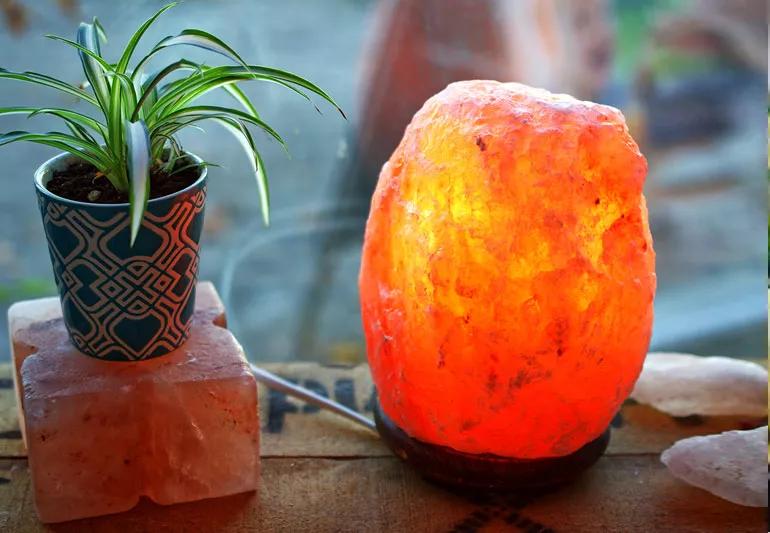Experts say health & environmental evidence is lacking

Himalayan salt lamps seem to be everywhere. You’ve likely seen the hue of a glowing pink light on a coworker’s desk. Or maybe you came across the lamp while scrolling through an interior design Instagram account.
Advertisement
Cleveland Clinic is a non-profit academic medical center. Advertising on our site helps support our mission. We do not endorse non-Cleveland Clinic products or services. Policy
These types of lamps are popular for their calming ambience, and many people like the look and feel of them. But beyond their appealing aesthetics, some claim that the lamps offer several health benefits, including:
So could a magic lamp be the missing link to your health and wellness quest? Primary care specialist Neha Vyas, MD, explains the truth behind this home décor-turned-wellness trend.
Video content: This video is available to watch online.
View video online (https://cdnapisec.kaltura.com/p/2207941/sp/220794100/playManifest/entryId/1_h4aocsgm/flavorId/1_5f3sgelj/format/url/protocol/https/a.mp4)
Functional medicine specialist Melissa Young, MD, explores the potential wellness benefits of Himalayan salt lamps.
The lamps are created from pink salt from near the Himalayan mountain range (although many fake ones are sold online or in stores). They are hollowed out, lit from the inside bottom with a bulb and omit a pinkish, amber-colored glow.
Lamp manufactures claim that the pink salt releases negative ions to help purify and improve the air quality around you. In addition to the cleaner air theory, many believe that the ions can increase your energy level, improve your sleep and mood and even reduce allergy symptoms.
Unfortunately, this magic lamp won’t grant you better health and wellness. This is true whether you spring for an authentic version or settle for a fake one.
“There’s not a lot of evidence to support the idea that Himalayan salt lamps provide some – if any – of the supposed health benefits,” says Dr. Vyas.
Advertisement
One study did suggest that negative ions might decrease depression in some people. However, these lamps don’t produce enough negative ions to make a difference.
Negative ions, in large enough quantities, have also been shown to kill dust mites in the air. But again, these lamps do not produce enough to have any real benefit. There is also no evidence to support the idea that the lamps can absorb toxins from the air around you.
Other people argue that the warm, glowing light provides a relaxing and calming atmosphere, which in turn promotes tranquility and improves mental health. However, this theory is purely anecdotal.
If you’re serious about trying to improve the air quality in your home, you can try an air purification machine, which have been shown to remove particles from indoor spaces, like allergens, smoke and mold.
So while these lamps continue to grow in popularity for their artful and soothing vibe, it’s best to take all of the claimed health benefits with, well, a grain of salt.
Still, if you like the lamp’s pinkish hue, there’s no need to get rid of it. Just be sure to practice good fire safety and keep the lamp in an area where it can’t be knocked over and out of reach of children and pets.
There’s little evidence to back up the claims about improved air quality, increased respiratory health and better mood and sleep. So if you’re looking for these health benefits, you might want to hold off on purchasing a salt lamp for every room of your house. However, there’s no harm in these lamps if you like the look, feel and style of them.
Advertisement

Sign up for our Health Essentials emails for expert guidance on nutrition, fitness, sleep, skin care and more.
Learn more about our editorial process.
Advertisement

Different types of yoga poses, meditation and breathwork may help you feel more emotionally balanced

There’s very little scientific evidence that this alternative medicine practice works

Spoiler alert: Science doesn’t back the numerous health claims

This traditional Chinese medicine practice may boost mental health, immune function, balance and more

This ancient form of exercise can offer a physical and mental boost

Many claims lack science-backed research, but halotherapy is popular and considered safe

This five-day exercise plan for beginners includes three days of resistance training, two days of cardio and two days of rest

If you don’t have an underlying condition, cold plunges might help ease sore muscles, decrease inflammation and even heighten your focus

Even small moments of time outdoors can help reduce stress, boost mood and restore a sense of calm

A correct prescription helps your eyes see clearly — but as natural changes occur, you may need stronger or different eyeglasses

Both are medical emergencies, but they are very distinct events with different causes